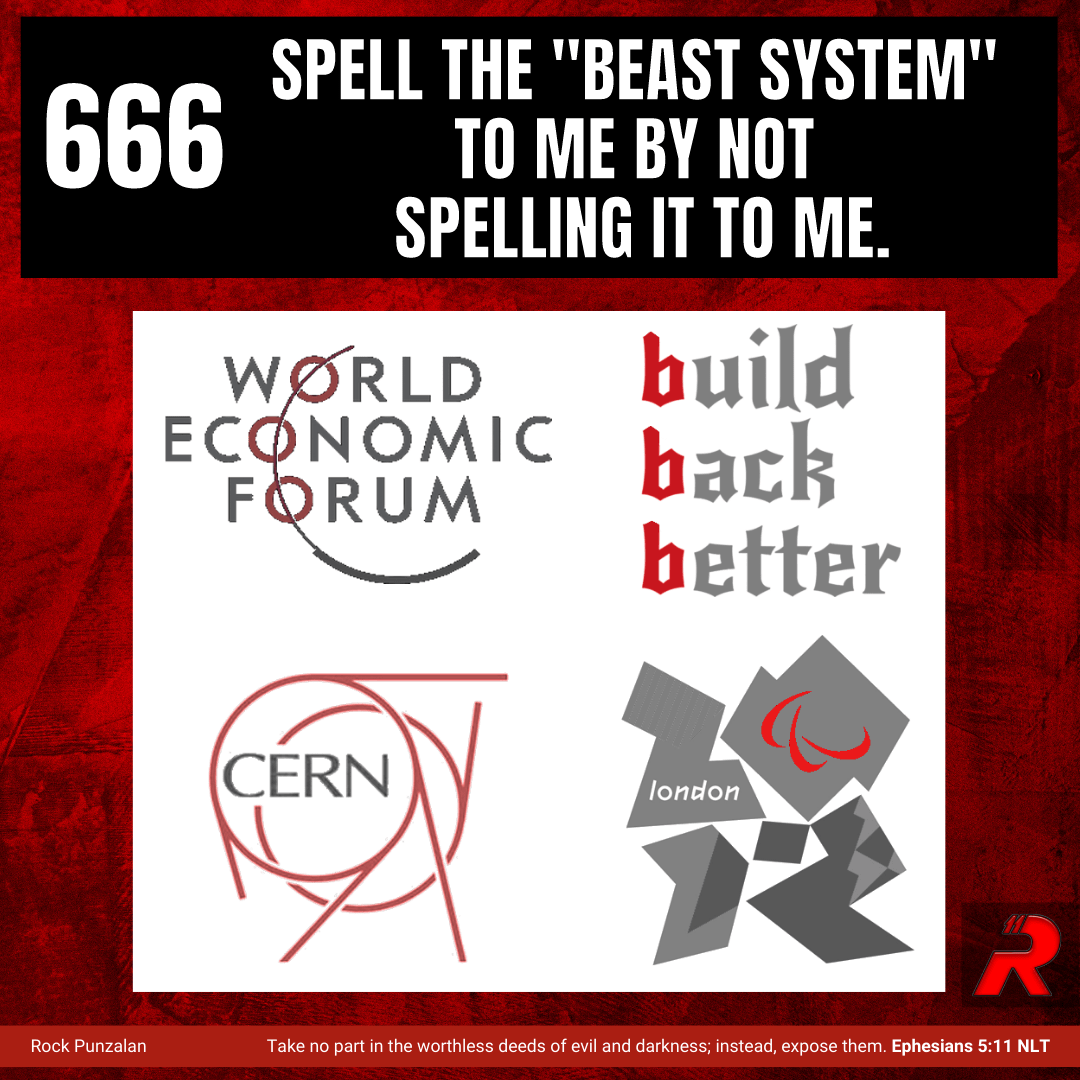Embedded scriptures in ancient Chinese language?
CCP (Chinese Communist Party) invests a tremendous amount of effort and propaganda to destroy the belief in God, as well as the propagation of Christian movements in mainland China. It is undeniable that Christian churches in China are being purged by the Xi Jinping communist regime, and the latest straw was Xi’s denigration of the Holy Bible by rewriting it to fit the communist narrative. Xi also recently slandered Jesus Christ by reprinting the Bibles with accusations that Christ was a proven sinner and killer (that Christ admitted sin, and that he stoned the adulterous woman mentioned in the gospel).
As one CCP township chairman mentioned, “Many rural people are ignorant. They think God is their savior,” he said. “After our cadres’ work, they’ll realize their mistakes and think: We should no longer rely on Jesus, but on the party for help.” This chairman then proceeded to remove Christian posters in homes and replaced them with the photo of comrade Xi Jinping.
This is how Communists rule. They erase culture. They destroy freedoms. They eradicate any belief or pollute/taint the real belief in God. To their eyes, any loyalty outside the Communist politburo is a threat to their absolute rule. Therefore, they enforce fatal restrictions in order to maintain control.
The irony is the CCP cannot erase the presence of God in China, as their own language, history, and culture speaks of the very God they seek to eradicate. Moreover, the discovery of the relation of the Biblical God to Chinese ancient language only shows that God left signposts for the faithful (specially in China!) to know more of Him.
First, let us mention that ancient China was mentioned in the Bible through the book of Isaiah 49:12 – “Behold, these shall come from far: and, lo, these from the north and from the west; and these from the land of Sinim.” As per Bible scholars, Sinim is synonymous to China.
We will divide our topic into two major points, language and history. Our main topic is language, but we will also touch on Chinese history to show the connections to the biblical God.
 The God of the bible in ancient Chinese language
The God of the bible in ancient Chinese language
 The God of the bible in ancient Chinese history
The God of the bible in ancient Chinese history
 The God of the bible in ancient Chinese Language
To give you an example, let us examine the ancient Chinese words that have underlying connections with the Genesis biblical narrative.
The God of the bible in ancient Chinese Language
To give you an example, let us examine the ancient Chinese words that have underlying connections with the Genesis biblical narrative.
 The Chinese word for Talk (or to Talk) is divided into three pictograms. They are Dust + Mouth + Life.
The Chinese word for Talk (or to Talk) is divided into three pictograms. They are Dust + Mouth + Life.
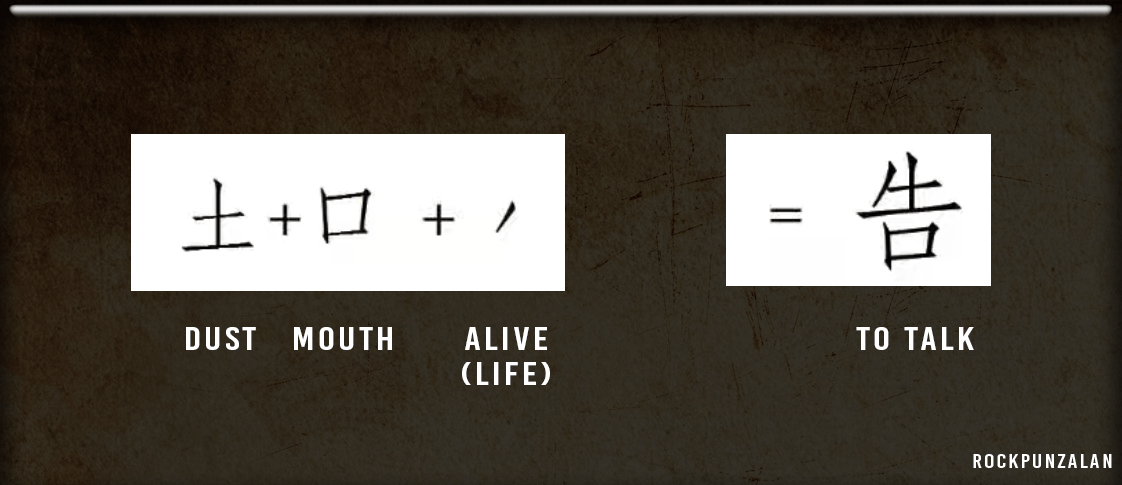
 The ancient Chinese word to Create is divided into to Talk (Dust + Mouth + Life) and Walking.
The ancient Chinese word to Create is divided into to Talk (Dust + Mouth + Life) and Walking.

 The ancient Chinese word Happiness is divided into God + One + Mouth + Garden.
The ancient Chinese word Happiness is divided into God + One + Mouth + Garden.

 The word Garden is divided into Surround (Enclosure/Protect) + Dust + Mouth + Two People coming from the side of the other .
The word Garden is divided into Surround (Enclosure/Protect) + Dust + Mouth + Two People coming from the side of the other .

 The word Execute (Put to Death) is divided into Words + Tree + Life + Dust.
The word Execute (Put to Death) is divided into Words + Tree + Life + Dust.

 The ancient Chinese word First is divided into Alive (Life) + Dust + Son.
The ancient Chinese word First is divided into Alive (Life) + Dust + Son.

 The word for West in Chinese is divided into One + Son (or Man) + Garden (Enclosure).
The word for West in Chinese is divided into One + Son (or Man) + Garden (Enclosure).

 The word to Covet or to Desire is divided into Two Trees + Woman.
The word to Covet or to Desire is divided into Two Trees + Woman.

 In ancient Chinese the word Satan or Devil is divided into Life (Motion) + Secret (Private) + Garden + Son. The word Tempter is divided into Two Trees + Cover + Devil.
In ancient Chinese the word Satan or Devil is divided into Life (Motion) + Secret (Private) + Garden + Son. The word Tempter is divided into Two Trees + Cover + Devil.


 The word Pain is divided into Two Trees + Under + Man.
The word Pain is divided into Two Trees + Under + Man.

 The ancient Chinese word for Naked is divided into two meanings. One is Person (Man) + Fruit, while the other is Clothing + Fruit.
The ancient Chinese word for Naked is divided into two meanings. One is Person (Man) + Fruit, while the other is Clothing + Fruit.

 The Chinese word for Hide is divided into Body + Several + Tree.
The Chinese word for Hide is divided into Body + Several + Tree.
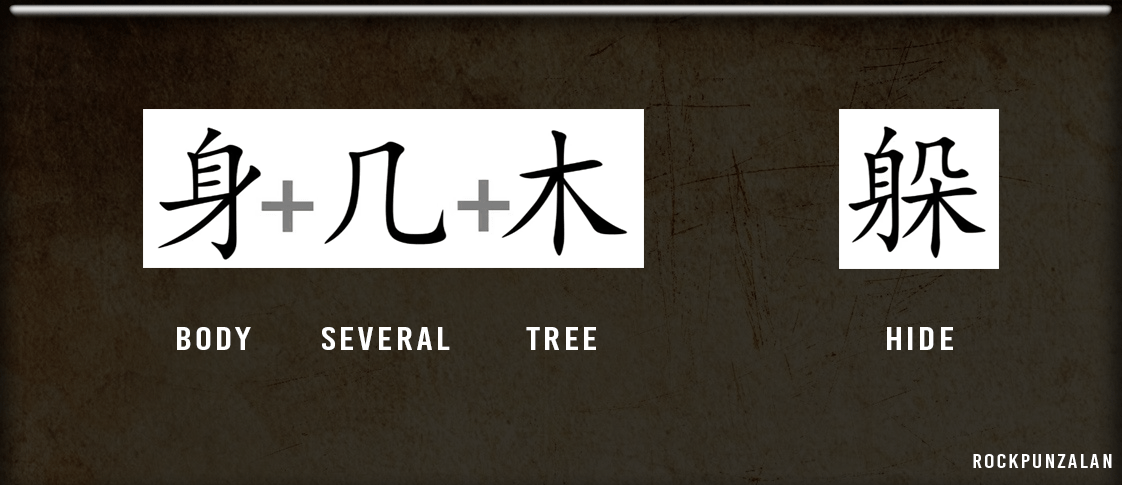
 The Chinese word for Righteousness (not Guilty) is divided into Me + Sheep. Also, the word Me is subdivided into Hand + Knife (Lance).
The Chinese word for Righteousness (not Guilty) is divided into Me + Sheep. Also, the word Me is subdivided into Hand + Knife (Lance).
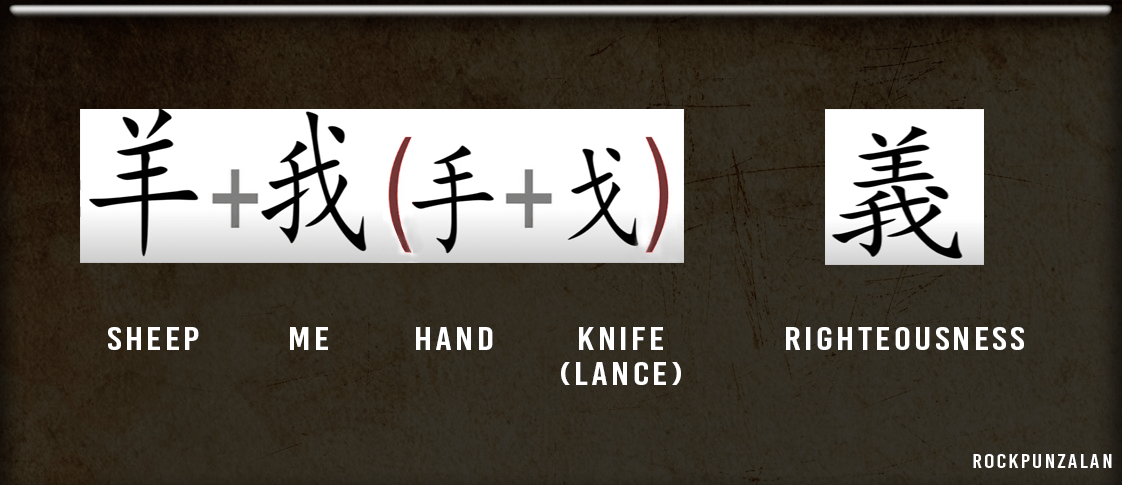
 In ancient Chinese, the word Cruel (Violent) is pronounced as “Shun”. It is divided into Mouth + Son (or Man). Also, the word Murderer is defined with the pictogram of man with a mark on the head (forehead).
In ancient Chinese, the word Cruel (Violent) is pronounced as “Shun”. It is divided into Mouth + Son (or Man). Also, the word Murderer is defined with the pictogram of man with a mark on the head (forehead).

 The ancient Chinese word for Boat (Ship) is divided into Mouth + Eight + Vessel. Also, the word Flood is divided into Water + Total (Together + One + Eight).
The ancient Chinese word for Boat (Ship) is divided into Mouth + Eight + Vessel. Also, the word Flood is divided into Water + Total (Together + One + Eight).


 The Chinese word Ark is divided into two pictograms of Rectangle + Vessel (Boat).
The Chinese word Ark is divided into two pictograms of Rectangle + Vessel (Boat).

 The Chinese word Tower is divided into the pictogram of Clay + Grass + United (All the People + One Mouth).
The Chinese word Tower is divided into the pictogram of Clay + Grass + United (All the People + One Mouth).
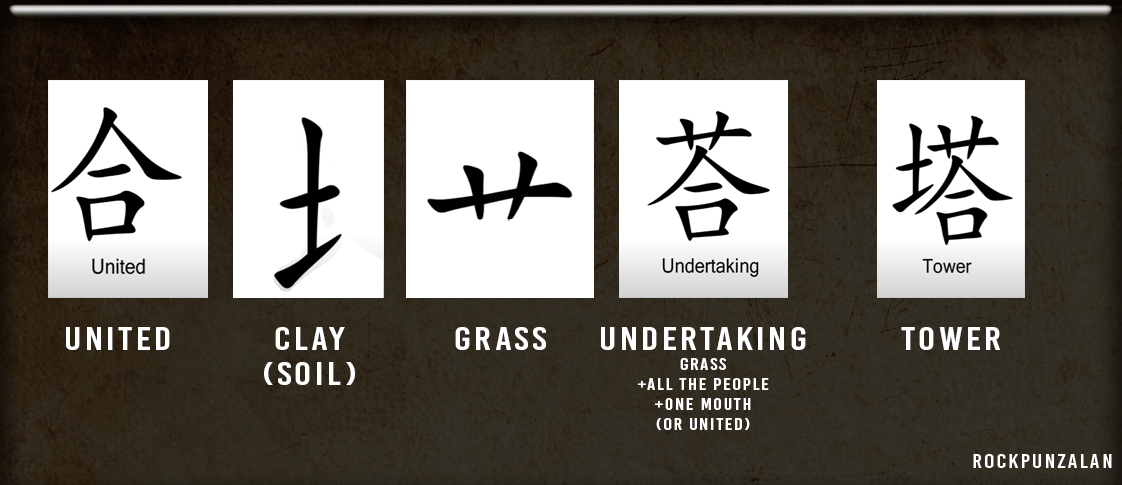
 The God of the bible in ancient Chinese History
The God of the bible in ancient Chinese History
 China was also called the Land of God.
China was also called the Land of God.
 Ancient Chinese worshiped ShangDi (Lord on High).
Ancient Chinese worshiped ShangDi (Lord on High).
 The Chiang-Min people (most ancient of Chinese tribes) believe in Yah-Weh.
The Chiang-Min people (most ancient of Chinese tribes) believe in Yah-Weh.
 Sanxingdui Tree (relic like the Tree of Knowledge in the Garden of Eden) was discovered recently in China
Sanxingdui Tree (relic like the Tree of Knowledge in the Garden of Eden) was discovered recently in China
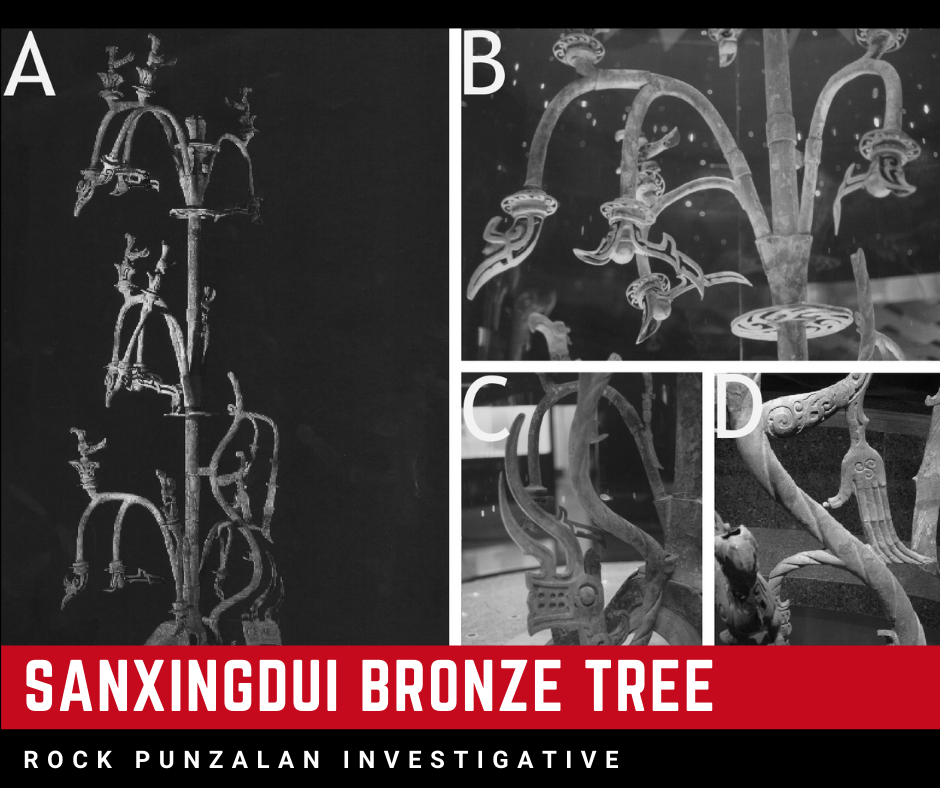
 The God of the bible in ancient Chinese language
The God of the bible in ancient Chinese language
 The God of the bible in ancient Chinese history
The God of the bible in ancient Chinese history
The ancient Chinese alphabet is a language mostly based on pictures. Therefore, there are words in ancient Chinese that are depicted and based on ideograms/pictograms (pictures). (I do not claim that I am a Chinese language expert, but the research done here is authentic, but is still subject to your validation. The information available on this topic is basically understandable to anyone who can read. Do your research on these facts brethren, as we encourage anyone to double check on it.)
For parallel passages we used the New King James Version (NKJV) of the Bible. It is also imperative to know that the Chinese language used here is ancient Chinese (old or archaic), and there are major differences to the ones used today (traditional and simplified). The Communist Party sought to change the traditional language through simplification (during 1952 by Mao Zedong and lately by the CCP in 2013).
 The God of the bible in ancient Chinese Language
The God of the bible in ancient Chinese Language The Chinese word for Talk (or to Talk) is divided into three pictograms. They are Dust + Mouth + Life.
The Chinese word for Talk (or to Talk) is divided into three pictograms. They are Dust + Mouth + Life.-
- Basically interpreting a simple word of “talk”, the pictogram appears to translate “to Talk” to Adam (from dust) getting life from the breath (mouth) of God. Unless, there is a hidden meaning behind it. In parallel, the book of Genesis 2:7 mentioned, “And the LORD God formed man of the dust of the ground, and breathed into his nostrils the breath of life; and man became a living being.“

 The ancient Chinese word to Create is divided into to Talk (Dust + Mouth + Life) and Walking.
The ancient Chinese word to Create is divided into to Talk (Dust + Mouth + Life) and Walking.-
- God created everything by speaking (talk) and He also walked in the Garden. “And they heard the sound of the LORD God walking in the garden in the cool of the day, and Adam and his wife hid themselves from the presence of the LORD God among the trees of the garden.” Genesis 3:8.

 The ancient Chinese word Happiness is divided into God + One + Mouth + Garden.
The ancient Chinese word Happiness is divided into God + One + Mouth + Garden.
-
- This one translates that Adam (the one man) found happiness “fú” (in ancient Chinese) when he walked in fellowship with God just as in the Garden story.

 The word Garden is divided into Surround (Enclosure/Protect) + Dust + Mouth + Two People coming from the side of the other .
The word Garden is divided into Surround (Enclosure/Protect) + Dust + Mouth + Two People coming from the side of the other .
-
- If you look at this one, you will easily associate that the Garden (yuán) is where one man was created from dust and the breath of God (mouth), while the other came out from the side of the other. They were also enclosed, hence the garden.

 The word Execute (Put to Death) is divided into Words + Tree + Life + Dust.
The word Execute (Put to Death) is divided into Words + Tree + Life + Dust.
-
- In the Bible, God spoke that Adam will die (lose his life) by returning to dust. This was in consequence with Adam partaking of the forbidden fruit from the tree of knowledge. It is obvious here that without the Genesis narrative, one cannot just associate “Death” or “Execution” to either words, tree, life and dust at the same time. In Genesis 3:19, “By the sweat of your brow you will eat your food until you return to the ground, since from it you were taken; for dust you are and to dust you will return.”

 The ancient Chinese word First is divided into Alive (Life) + Dust + Son.
The ancient Chinese word First is divided into Alive (Life) + Dust + Son. -
- Looking into the Bible, the first man (or son also translated as first earthly branch) created in the image of God was Adam (before 4000 years ago). He was also created from dust and became alive when God breathed into him (mouth) just as we referred to Genesis 2:7 above.

 The word for West in Chinese is divided into One + Son (or Man) + Garden (Enclosure).
The word for West in Chinese is divided into One + Son (or Man) + Garden (Enclosure).-
- The biblical Garden of Eden if checked in the world map is east (near Euphrates and Tigris rivers) given the reference of Moses. However, for the Chinese, the location of Eden is West in reference to the location of China. Also, Adam was the first man created in the image of God (Just like his son in Genesis 5:3). In parallel, Genesis 2:8 says “The LORD God planted a garden eastward in Eden, and there He put the man whom He had formed.” Clearly, the translation for West meant that a man was in a Garden.

 The word to Covet or to Desire is divided into Two Trees + Woman.
The word to Covet or to Desire is divided into Two Trees + Woman. -
- Notice that in the garden of Eden, there were two trees, the Tree of Knowledge of Good and Evil and the Tree of Life. It is also written that Eve (the Woman) desired or coveted the forbidden fruit when she was tempted by the Serpent. In parallel, Genesis 2:8-9 “The LORD God planted a garden eastward in Eden, and there He put the man whom He had formed. And out of the ground the LORD God made every tree grow that is pleasant to the sight and good for food. The tree of life was also in the midst of the garden, and the tree of the knowledge of good and evil.“ Genesis 2:16-17 “And the LORD God commanded the man, saying, “Of every tree of the garden you may freely eat; but of the tree of the knowledge of good and evil you shall not eat, for in the day that you eat of it you shall surely die.” In Genesis 3:6 “So when the woman saw that the tree was good for food, that it was pleasant to the eyes, and a tree desirable to make one wise, she took of its fruit and ate. She also gave to her husband with her, and he ate.“

 In ancient Chinese the word Satan or Devil is divided into Life (Motion) + Secret (Private) + Garden + Son. The word Tempter is divided into Two Trees + Cover + Devil.
In ancient Chinese the word Satan or Devil is divided into Life (Motion) + Secret (Private) + Garden + Son. The word Tempter is divided into Two Trees + Cover + Devil. -
- To translate, Satan (or Devil “Gui”) secretly moved to tempt Man (through the Woman) in the Garden. The Tempter was also the Devil in disguise (cover) in the garden where there were the (two) trees, the trees of life and knowledge of good and evil. In Genesis 3:1, “Now the serpent was more cunning than any beast of the field which the LORD God had made. And he said to the woman, “Has God indeed said, ‘You shall not eat of every tree of the garden’?”


 The word Pain is divided into Two Trees + Under + Man.
The word Pain is divided into Two Trees + Under + Man.-
- It can be translated as the Pain (“Chu” in birth pains) caused by partaking of the fruit from one of the two trees. Basically, the Woman (Eve) was punished for her action in partaking of the forbidden fruit and her husband will rule over her (under). As mentioned in Genesis 3:6 “…she took of its fruit and ate…”, and in Genesis 3:16 “To the woman He said: “I will greatly multiply your sorrow and your conception; In pain you shall bring forth children; Your desire shall be for your husband, And he shall rule over you.”

 The ancient Chinese word for Naked is divided into two meanings. One is Person (Man) + Fruit, while the other is Clothing + Fruit.
The ancient Chinese word for Naked is divided into two meanings. One is Person (Man) + Fruit, while the other is Clothing + Fruit.-
- Now, if you look at it, it would be illogical to define nakedness in connection to fruits (garden + tree) – that unless there is a story behind it. In Genesis 3:7 “Then the eyes of both of them were opened, and they knew that they were naked; and they sewed fig leaves together and made themselves coverings.”

 The Chinese word for Hide is divided into Body + Several + Tree.
The Chinese word for Hide is divided into Body + Several + Tree.-
- Adam and Eve hid behind the trees when God came into the garden. By this time they are already aware that they were naked, and so they tried to hid their bodies. In Genesis 3:8 “And they heard the sound of the LORD God walking in the garden in the cool of the day, and Adam and his wife hid themselves from the presence of the LORD God among the trees of the garden.”

 The Chinese word for Righteousness (not Guilty) is divided into Me + Sheep. Also, the word Me is subdivided into Hand + Knife (Lance).
The Chinese word for Righteousness (not Guilty) is divided into Me + Sheep. Also, the word Me is subdivided into Hand + Knife (Lance).-
- In basic doctrine, we know that the actions made by Adam and Eve made them guilty of sin, which ultimately separated them from the presence of the righteous God (lost fellowship). In Hebrew and Biblical traditions, it is imperative for one to sacrifice a clean animal for the atonement of guilt or sin. There are interpretations that God sacrificed a sheep for Adam and Eve when they sinned in the garden. However, no mention was made of a sacrifice, but that God made clothing from animal skin to cover man’s perceived nakedness. Nevertheless, it appears that the Chinese incorporated this interpretation into the word “Righteousness”. In Genesis 3:21, “Also for Adam and his wife the LORD God made tunics of skin, and clothed them.”

 In ancient Chinese, the word Cruel (Violent) is pronounced as “Shun”. It is divided into Mouth + Son (or Man). Also, the word Murderer is defined with the pictogram of man with a mark on the head (forehead).
In ancient Chinese, the word Cruel (Violent) is pronounced as “Shun”. It is divided into Mouth + Son (or Man). Also, the word Murderer is defined with the pictogram of man with a mark on the head (forehead).-
- In the Bible we know that Cain (the elder son of Adam) killed his brother Abel violently, and God spoke (mouthed) to him his punishment for doing so. So that he will not be killed by other men, a mark was placed by God on his head. In Genesis 4:8 “Now Cain talked with Abel his brother; and it came to pass, when they were in the field, that Cain rose up against Abel his brother and killed him.“. In Genesis 4:15 “And the LORD said to him, “Therefore, whoever kills Cain, vengeance shall be taken on him sevenfold.” And the LORD set a mark on Cain, lest anyone finding him should kill him.”

 The ancient Chinese word for Boat (Ship) is divided into Mouth + Eight + Vessel. Also, the word Flood is divided into Water + Total (Together + One + Eight).
The ancient Chinese word for Boat (Ship) is divided into Mouth + Eight + Vessel. Also, the word Flood is divided into Water + Total (Together + One + Eight).-
- We know that by the biblical narrative of Genesis, Noah boarded the ark to survive the cataclysmic great flood. There were all eight (8) mouths (of people) in the ark. Now the ark was a gigantic boat, and any giant ancient ship (even modern ones) can board from hundreds to thousands of people. It is unreasonable to make the meaning of the word “Large Ship” into 8 people when we know such vessels can accommodate so much more. Unless of course, there is a story behind that meaning. Also, the flood that produced massive amounts of water, only had a total of eight people survivors. They all boarded the ark together (the only one family). In Genesis 7:13 “On the very same day Noah and Noah’s sons, Shem, Ham, and Japheth, and Noah’s wife and the three wives of his sons with them, entered the ark—”


 The Chinese word Ark is divided into two pictograms of Rectangle + Vessel (Boat).
The Chinese word Ark is divided into two pictograms of Rectangle + Vessel (Boat).-
- The word for Ark in Hebrew is ?????? (tebah), (also bulrush basket in which Moses was laid as a child and then placed in the Nile) (Exodus 2:3). As per the Bible, we know that God instructed Noah to build the ark for the coming flood. Although the dimensions mentioned in the Bible would mean that it was box-like (rectangle) in dimensions, it did not elaborate if the shape was somehow different. In Genesis 6:14-16 “Make yourself an ark of gopherwood; make rooms in the ark, and cover it inside and outside with pitch. And this is how you shall make it: The length of the ark shall be three hundred cubits, its width fifty cubits, and its height thirty cubits. You shall make a window for the ark, and you shall finish it to a cubit from above; and set the door of the ark in its side. You shall make it with lower, second, and third decks.“

 The Chinese word Tower is divided into the pictogram of Clay + Grass + United (All the People + One Mouth).
The Chinese word Tower is divided into the pictogram of Clay + Grass + United (All the People + One Mouth).-
- This one basically relates to the Tower of Babel narrative. It says that the Tower (of Babel) was made by clay and grass (bricks). The effort was made by the united people of the world who spoke in one language (mouth). “Undertaking” in ancient Chinese is also a combination of Grass + United. Now, analyzing this translation, you cannot miss that the word “tower” has no common meaning to the definition attributed to it. Only the Tower of Babel story will make sense. In Genesis 11:1-4 “Now the whole earth had one language and one speech. And it came to pass, as they journeyed from the east, that they found a plain in the land of Shinar, and they dwelt there. Then they said to one another, “Come, let us make bricks and bake them thoroughly.” They had brick for stone, and they had asphalt for mortar. And they said, “Come, let us build ourselves a city, and a tower whose top is in the heavens; let us make a name for ourselves, lest we be scattered abroad over the face of the whole earth.”

These translations can be interpreted as breadcrumbs that ancestral Chinese believers (of God) may have left behind for the people of the future. It cannot be denied that there were signs literally left in the ancient Chinese language to proclaim the events in Genesis, and the biblical creation and beginning narrative. The Chinese couldn’t have known this as the Bible was not created yet during the time the Chinese written language was invented in 2400BC. Unless of course, they had ancestors who were part of the great separation from the Tower of Babel, migrated to the land that is now known as China, and brought with them together the stories (by word of mouth) and traditions of the people in biblical Genesis!
 The God of the bible in ancient Chinese History
The God of the bible in ancient Chinese HistoryThe recorded (written) Chinese culture began in 2070 BC during its first kingdom (Xia Dynasty), while the evidence of the first Chinese writing was dated at 2420 BC. Meanwhile, the confusion in the Tower of Babel (as written in the Bible) was dated at 2400 BC. As we presented in our first point, it is highly probable that the ancient Chinese written language could have been influenced by the events connected to the biblical God (Creation in the Garden, Noah’s Flood and Tower of Babel). It is impossible for a Chinese ancestor to know of such narratives since the Bible was only written at 1445 BC during the Exodus years of Moses. The nearest theory here is that witnesses (Chinese ancestors) from Babel migrated to China and brought with them the stories of the biblical God. In Chinese history, there are also markers that will give us hints of the influence of the Almighty God.
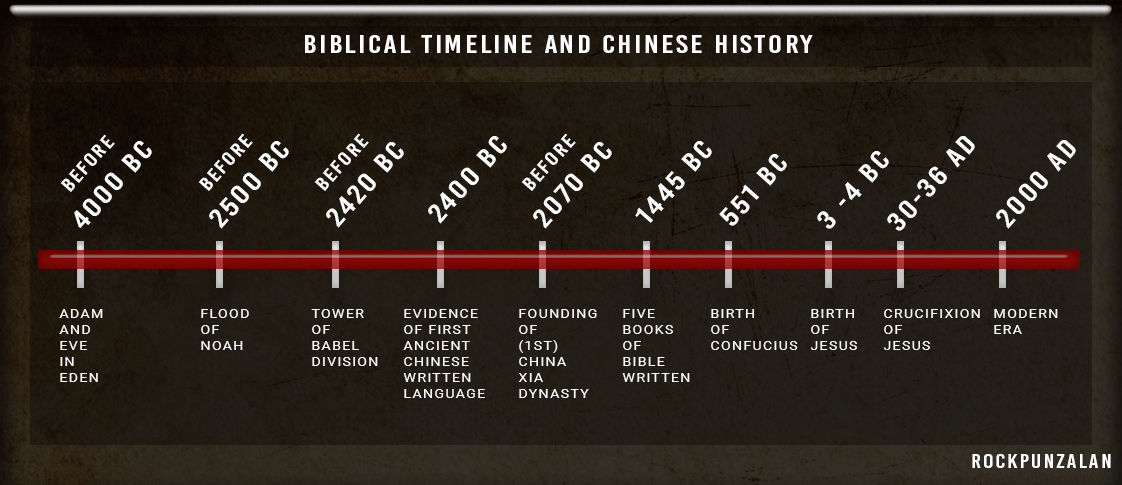

 China was also called the Land of God.
China was also called the Land of God.- In ancient Chinese history, China had another name which was ?? or Shénzhou literally translated to Divine (God) Land (State) or Land of God.
 Ancient Chinese worshiped ShangDi (Lord on High).
Ancient Chinese worshiped ShangDi (Lord on High).- Famous Chinese philosopher Confucius believed in the God of the Heaven whom the Chinese called as Shàngdì.
- This God of Heaven is seldom mentioned now in Chinese religions. The ancient Chinese built a temple (Temple of Heaven) for a God without a face, relic or statue. They called this supreme god as Shàngdì (??, “Lord on High“) or Dì (?,”Lord“). They sacrificed clean animals for the forgiveness of sins (just like the Hebrews did). This sacrifice was called border sacrifice rite by the Shangs. Abel and Cain were noted to have probably made their sacrifice at the border east-side of the Garden as per Genesis chapter 3. So the ancient Chinese may have inherited this practice of sacrificing at the border.
- It is also notable that there are phonetic similarities between ShangDi (Di pronounced as Dai in ancient Cantonese) and the Hebrew God – Shaddai (Almighty). The original Shangs also believed that God of heaven controlled the world, Emperors (Kings) get their mandate from this same God, and they also believed in the coming of the Messiah. The worship of ShangDi was formally ended in 1911 during the Chinese revolution.
- There is no writing that they worship the same God, but the influence is definitely visible.
 The Chiang-Min people (most ancient of Chinese tribes) believe in Yah-Weh.
The Chiang-Min people (most ancient of Chinese tribes) believe in Yah-Weh.- The Chiang-Min tribe of Szechuan China believes in one God. The plough that they use is drawn by two oxen, just like how the Israelites did. In times of distress or calamities, they call upon God by crying Yah-weh or Yawei. They also have a concept of sacrifice just as practiced in the Bible. Their priests wore girdles and bound their robes while bearing a serpent-like rod (like Moses). Their concept of God is that He is all-powerful, that He watches the world, judges fairly, rewards righteousness and punishes sins. Even the prayers of the Chiang-Min involve blood, sacrifice, purity and food choice (like Kosher).
 Sanxingdui Tree (relic like the Tree of Knowledge in the Garden of Eden) was discovered recently in China
Sanxingdui Tree (relic like the Tree of Knowledge in the Garden of Eden) was discovered recently in China
- In 1986, the Sanxingdui Tree bronze relic was discovered. The piece was dated at 2700-4000 BC. It’s appearance is undeniably influenced by the Tree of Knowledge of Good and Evil in the Garden of Eden story. A serpent-like creature runs through the tree, and it has horns and two feet. Round-shape fruits are protected by knives, giving the appearance that it is forbidden. Lastly, a hand that is poised to take a fruit is built into the relic (just like the hand of Eve).
References:
- Chan Kei Thong “The Faith of our Fathers”The Faith of our Fathersa
- Bible Study Tools Land of Sinim
- NY Times Chinese Police Dynamite Christian Megachurch
- NY Times As China Cracks Down on Churches, Christians Declare ‘We Will Not Forfeit Our Faith’
- The Federalist China To Christians: We’re Rewriting The Bible, And You’ll Use It Or Else
- Barnabas Fund Chinese Communist Party rewrites Gospel story to depict Jesus Christ as “killer and sinner”
- The Washington Post Jesus won’t save you — President Xi Jinping will, Chinese Christians told
- PBS Chiangmin people of China
- New York Times The Chinese Language, Ever Evolving
- Jews of China Chiang Tribe of China came from the Far West
- PBS Where are the ten lost tribes?
- China Highlights History of Chinese Literature, China Literature in Ancient Time
- A Defense of the Bible Ancient Chinese Culture Confirms Genesis Snake
- Wikipedia 1911 Revolution
- Donald Trump and the Herbrides Revival connection
- Beware and be aware of the Great Reset
- Preparing for Shmita Year 2021-2022
- Barack Obama – the Shadow President?
- Embedded scriptures in ancient Chinese language?
- Establishing the Lazarus Narrative
- The scourge of Communism in America
- Should Christians support the Democrat party?
- Mainstream Media cannot decide US Presidency
(Visited 154 times, 1 visits today)




